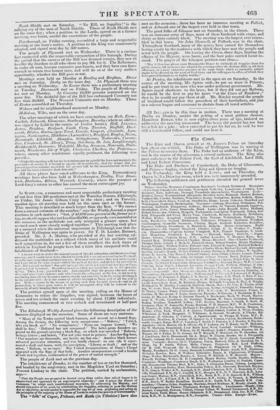.' I to not wish to revive the remembrance of
the old calamities and distresses of my country, and I would never have alluded t o them it it were not as a caution to ell—to al!, even the most imprudent aud most unwary. Bewareof such times ; they may occur :t gain ; and 1 say Ibhow the wise coarse—folluw the path of the law, and then I say you will be sae. But you ask me how ? Say netiting i,r private which yes would not sea say, as 1 say. in presture of thousands. Do »otitis!) is steret.whirh you would not do is the open face of day. Then, I say, yon will be sate. And consider that the person who acts other- wise, and who shows violence, and who forgets the safbgnard of the law, is not merely sacrificing himself, but he comes unconsciously nail unwarily to be the cause of triumph to the mimics of it ; he is the source of ell the triumph to them, and of all the evil to you. If thew cannot be the means of getting such men brought forward—and in all probability, if times grow worse, it will be attempted—they will be reduced to the necessity or only hanging their own spies."
The petition agreed upon at the meeting, calling on the House of Commons to refuse the Supplies, was signed, between the hours of seven and ten o'clock the same evening, by about 17,000 individuals. The meeting commenced at two o'clock and terminated at half-past five.
The Edinburgh Weekly Journal gives the following description of the banners displayed on the occasion. Some of them are very ominous.
" Many of the Trades carried black banners, and several tri-ecloured flags. Among the devices, the following were conspicuous —' Reform,' United, who can break us?' No compromise,' Nemo me impune lacessit,' We shall be free,' Defeated but not conquered.' fhe letter-press founders ap- peared on the ground carrying a black flag, on which was inscribed ' Reform,' in large letters ; and below, Pot not your trust in princes.' Another flag bore, Our numbers are thousands, our hearts are but one.' Another black banner attracted particular attention, and was loudly cheered : on one tide it repre- sented a skull and bones, with the inscription, Liberty or death ;' and on the other, Reform, or no taxes.' The United Incorporations of Mary's Chapel appeared with the flags of that body. Another incorporation carried a bundle of rods tied together, emblematical of the power of united strength."
The people of Leith met on the previous day.
The inhabitants of Dundee, to the number of ten or twelve thousand, and beaded by the magistracy, met in the Magdalen Yard on Saturday; Provost Lindsay in the chair. The petition, carried by acclamation, says- " That the People are prepared to hazard every thing rather than submit longer to be misgorerned and oppressed by an unprincipled oligarchy ;" and it prays the House of Commons "to adopt such constitutional measures, by addressing his Majesty, and should this prove of no avail, by withholding the Supplies, refusing to pass the Mutiny Act or otherwise, as will render it impossible for any set of men, professing and acting on theprinciples of the majority of the House of Lords,to retain the powers of Government." The "folk" of Cupar, Pitlessie, and Kettle (in Fifeshire) have also
met on the occasion ; there has been an immense meeting at Falkirk, and at Arbroath one of the largest ever held in that town.
The good folks of Glasgow met on Saturday, in the Green. There was an immense array of flags, most of them bordered with crape, and thirty or forty entirely black. The meeting was the largest ever assem- bled in that town. Sir John Maxwell, of Pollock, was in the chair. Throughout Scotland, many of the gentry have earned for themselves lasting credit by the readiness with which they have met the people and acted with the people. On leaving the Green, three flags, bearing the effigies of his Majesty, were burnt, and the bare poles carried home in- stead. The prayer of the Glasgow petition runs thus- " May it therefore please your Honourable House to withhold all Supplies from the public money, till measures are adopted for securing either the Reffirm Bills in all their efficiency, or a more extensive measure of the same kind ; which we earnestly submit ought to be effected by the recta of Earl Grey and his colleagues to office, of which they- have proved themselves so highly worthy."
At Paisley, the inhabitants met in the open air on Saturday. In the course of the meeting, Mr. Spiers said—be put no trust in Princes, and he put trust in no man who was under petticoat government. Mr. Spiers urged obedience to the laws; but if they did not get Reform, he would be the first to pay his taxes "at the Cross of Renfrew ;" that is, he would not pay them at all. Mr. Ritchie trusted the people of Scotland would follow the precedent of their forefathers, and join in a solemn league and covenant to abstain from all taxed articles.


























 Previous page
Previous page